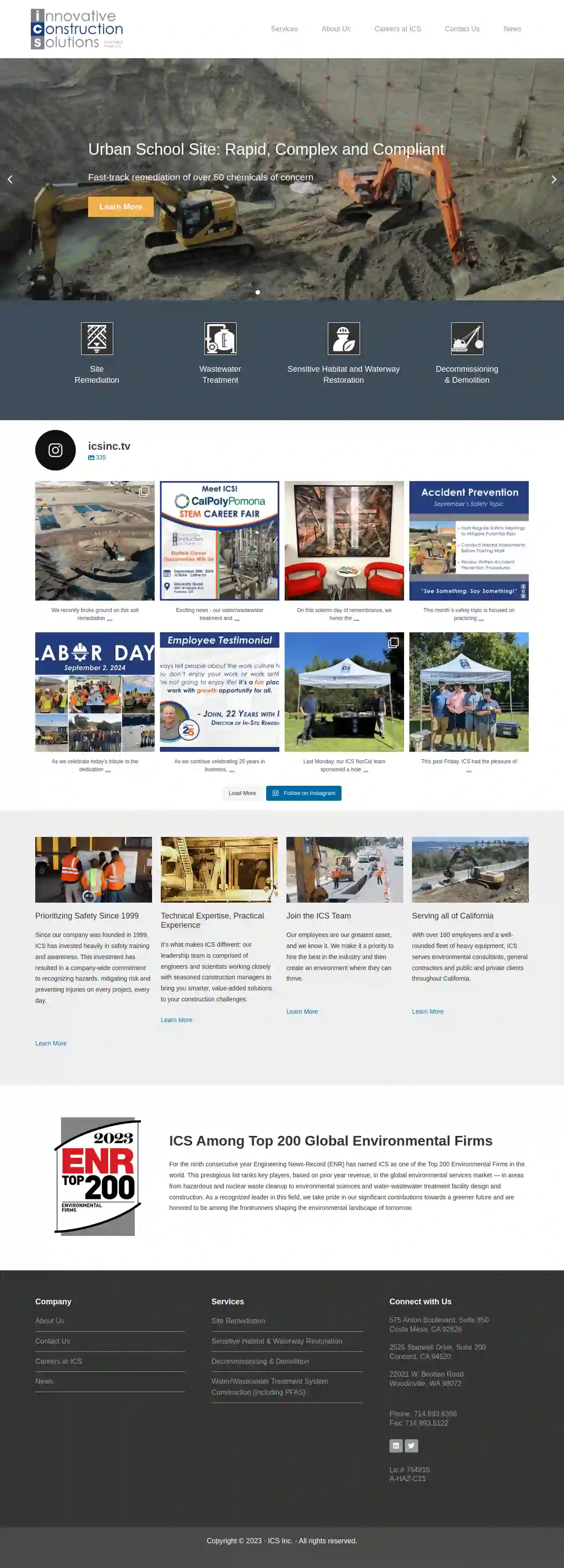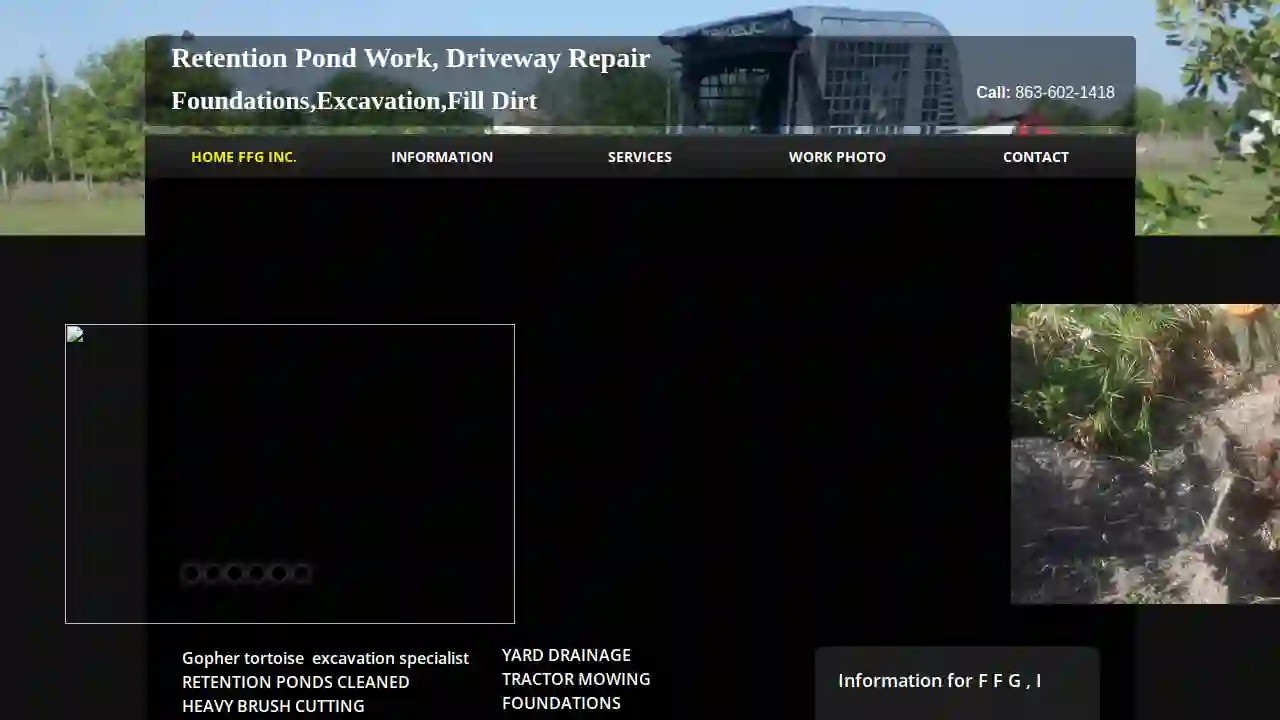Demolition Contractors Bell
Find Demolition Services in Bell
Get up to 3 Demolition Experts quotes for your project today! Compare profiles, reviews, accreditations, portfolio, etc... and choose the best offer.

Coastal Excavation & Construction Inc
51 reviewsPO 585, Goleta, 93116, USMeet Chad Cushman - Founder of Coastal Ex Founded in 2007 by Santa Barbara native and avid waterman, Chad Cushman - Coastal Ex started with a vision as expansive and clear as the California coastline. Just as the coast is a dynamic meeting point of land and sea, Cushman saw an opportunity to bridge creativity and stability in the construction industry. Cushman’s strong compass, guided by a commitment to quality, reflects his unwavering dedication to excellence amidst ever-changing conditions. Each project under his direction embodies his commitment to meticulous craftsmanship and innovative thinking and problem solving in a dynamic industry. Coastal Excavation and Construction continues to stand as a testament to the integrity and enduring quality that define his vision and the essence of the coastal spirit. When he’s not on site with his team, you can find Chad in his workshop welding, tending to his growing orchard or swimming in the Pacific Ocean that he’s grateful to call his backyard. Decades of Results Coastal Excavation & Construction is a highly skilled and licensed general engineering contractor specializing in a wide range of services, from custom design and drawings to demolition, excavation, grading, trenching, pipe installation, backfill, drainage, erosion control, footings, foundations, structural building, light duty building, pool excavation, driveways, hardscapes, septic systems, fire prevention, land clearing, heavy duty landscaping, and hauling. With a commitment to quality and customer satisfaction, Coastal Ex has been serving the Santa Barbara County and Central Coast communities for over 15 years. Their team of experienced professionals is dedicated to providing exceptional service and delivering projects on time and within budget. Whether you're looking to build your dream home, renovate your existing property, or tackle a challenging landscaping project, Coastal Ex has the expertise and resources to make your vision a reality.
- Services
- Why Us?
- Our Team
- Gallery
Get Quote
Earth Basics Contracting Corporation
55 reviews3010 E. Miraloma Ave, Anaheim, 92806, USEarth Basics is Leading California & Texas in Site Balancing Earth Basics has managed more than 100 million square feet of earthwork ventures which include warehouses, retail centers, office complexes, food processing plants, manufacturing facilities, and more. Extensive in-house resources enable Earth Basics to tailor their services to meet and exceed their client’s needs and project objectives. Earth Basics efficiently coordinates their earthwork, focusing on time, cost and quality issues to guarantee results. Each project is unique, varying in scope, requiring customized designs, approaches, and applications. A systematic yet adaptable project management program is key for project success. By paying close attention to detail, quality is raised while simultaneously controlling costs. We anticipate and avoid problems rather than fixing them once they happen. No matter which direction your projects may take, Earth Basics stands ready to meet your earthwork needs. Levees & Flood Control Over the past decade, the Western US has seen the opposite end of the weather spectrum. The drought and the following weather systems that followed have changed our landscapes, damaged pre-existing infrastructure and cause millions in damage. Levees and flood control built before the drought may not be ready for the next waves of winter weather we have recently witnessed. In foresight flood control and storm water control has become a recent addition to our capabilities for all industries. This was natural to move for us, as we already offer civil engineering services, technology services, and equipment to perform this type of work, which is typically needed on very short notice. Earth Basics’ culture and customer service attitude allows for a quick response in a time of need, and we have what it takes to get the job done in a timely and cost efficient manner. Land Clearing/Demo Structure demolition, boulder removal, uprooting trees and vegetation. If you got it, Earth Basics can clear it out. Our unique earthwork experience in the business allows us to ‘value engineer’ the project, while planning and scheduling to account for all project obstacles from the start. Depending on your needs, Earth Basics can centralize the process and assume responsibility for everything from conceptual development through the design and construction. We know what works best, and can quickly and efficiently perform the task. Golf Courses The key feature of the world’s greatest golf courses is their grounds. Our expert crews and a specialized fleet of heavy equipment provide premium earthworks, excavation, and land clearing services to achieve even the most complicated elements of course design. From ground zero to C of O we do it all. Our estimating department uses cutting edge technology to produce accurate takeoffs and 3D modeling. With GPS Machine and Grade Control technology, ensuring we save your time and money on your project by getting it done faster, with incredible accuracy, and with minimal surveying costs to the property owner. Public Works Governments exist to protect the health, safety, and welfare of its citizens. America’s public works systems are part of the framework for that existence. Earth Basics infrastructure design can provide roads for safe travel, utilities for clean water, parks for recreation, and storm water management for protection against flooding. The quality of these infrastructure systems (roads, water distribution, wastewater collection, and storm drainage), impact the perception of the area and reflect its reputation. These types of projects have always been a great fit for the Earth Basics team. Housing Tracts Building a track home community is a large undertaking and land planning feet. Without the proper earthworks team, your project can be delayed or even worse encounter costly problems down the road. Our team at Earth Basics takes pride in our attention to detail with land development and controlled earthwork. Many subcontractors continuously praise and hope to start their work behind the earthwork's execution of work done on the preliminary subdivision plans, subdivision plat, and general grading. Testimonials Earth Basics leads in value added engineering while specializing in earthwork, excavation, heavy general engineering, site balancing, mass grading, ripping, scarification, moisture conditioning, dozing, 3D site modeling, land clearing, demolition, earthwork finishing, landfill closers and much more. Working throughout California, Arizona, and Texas, our highly trained staff develops innovative solutions to a variety of land and infrastructure needs in both the private and public sectors. Our team works in tandem with civil and soils engineer to establish balanced job sites during the essential preliminary stages of construction and site development. It is a common fact that most contractors prefer to start their work after Earth Basics develops perfected building pads.
- Services
- Why Us?
- Testimonials
- Gallery
Get Quote
Cascade Environmental
51 reviews22722 29th Drive SE, Ste 228, Bothell, 98021, USWho We Are Cascade Environmental is a field services contractor that partners with our clients to provide seamless environmental and geotechnical solutions, from concept to completion. Over the last 25+ years, Cascade has grown from a Northwest US regional drilling company into a national, full service organization offering innovative solutions for every step of your project. Mission To contribute to a sustainable future through environmental investigation and restoration. Vision To be the premier company that leverages safety, employee expertise, technology, and sustainability to continuously outperform our competition in the infrastructure and environmental remediation industry. Core Values We believe in providing a workplace free of recognized hazards for the safety, health and well-being of our employees and clients. We believe in growing our business in a responsible manner through significant investment in our people, our company, and our communities. We believe in exceeding expectations in everything we do. We believe in working together to achieve goals thru integrity, accountability, and trust. CASCADE ENVIRONMENTAL® Cascade Environmental is the leading field services provider of environmental and geotechnical drilling, site investigation, and remediation. We offer the full suite of drilling technologies including sonic, auger, rotary, and direct push. Our crews are experienced in traditional and high resolution site characterization technologies for groundwater sampling and analysis, contaminant mass and distribution, and other in situ data for detailed and accurate conceptual site models. We also offer a line of injectable amendments designed to help you reach site closure faster and cost-effectively. Who We Are Our experts understand the importance of accurate sampling regardless of geologic conditions. Whether a discrete or representative sample is needed, Cascade has the tools and technologies to obtain it. Our experienced crews can obtain samples from soil, rock and even the most difficult subsurface conditions. Cascade offers a full range of environmental drilling and sampling services for nearly any application. We conduct soil, soil gas, and groundwater sampling, including discrete and representative sampling, vertical aquifer profiling, and bedrock coring.
- Services
- Why Us?
- Gallery
Get Quote
Innovative Construction Solutions
52 reviewsCosta Mesa, USICS: Your Partner in Environmental Remediation and Construction ICS is a leading provider of environmental remediation and construction services, specializing in complex projects that require a high level of expertise and experience. We have a proven track record of success in a wide range of industries, including: Site Remediation Wastewater Treatment Sensitive Habitat and Waterway Restoration Decommissioning and Demolition Water/Wastewater Treatment System Construction (including PFAS) Our team of highly skilled professionals is committed to providing our clients with the highest quality services, on time and within budget. We are dedicated to safety, environmental protection, and community engagement. We are proud to be a trusted partner for our clients, and we are committed to exceeding their expectations.
- Services
- Why Us?
- Gallery
Get Quote
Edri Construction
4.851 reviews1 Belvedere Pl, Mill Valley, 94941, USYour Trusted Construction Partner: Excellence from Demolition to Finishes People are looking for a reputable and reliable contractor. It does indeed represent us, but what sets us apart is the ability to be attentive to the customer and guide him patiently, from the demolition stages to the impeccable finishes, with professionalism as the common thread between each and every stage. We handle even the most complex projects entirely in-house, utilizing our own team of experts and advanced equipment. This practice allows us to accurately budget every project, ensuring transparency and efficiency throughout the process. Thanks to our satisfied customers, our growth is largely fueled by referrals. We strive to maintain this momentum by consistently exceeding expectations and delivering exceptional results. At Edri Construction, we bring expertise, reliability, and a commitment to excellence to every project we undertake.
- Services
- Why Us?
- Gallery
Get Quote
Poelman Construction
52 reviews123 Main Street, CITY, 12345, USAbout Poelman Inc. Poelman Inc. is a family-owned and operated business with over 30 years of experience in the construction industry. We are committed to providing our clients with high-quality workmanship and exceptional customer service. Our team of skilled professionals is dedicated to delivering projects on time and within budget. We specialize in a wide range of construction services, including: New construction Remodeling Additions Roofing Siding Windows and doors Decks and patios And more! We are proud to serve the [CITY] community and surrounding areas. Our commitment to quality and customer satisfaction has earned us a reputation as a trusted and reliable construction company. We are dedicated to building lasting relationships with our clients and exceeding their expectations on every project.
- Services
- Why Us?
- Testimonials
Get Quote
Florida Finish Graders, Inc.
52 reviewsDavis, USFlorida Finish Graders, Inc. Florida Finish Graders, Inc. is located in Central Florida, with Service provided coast to coast. We are your source for central Florida land clearing, grading, excavation, foundations, and bobcat work, tractor work. We here at Florida Finish Graders, Inc. do the best work the first time, and at the most affordable price! Our Mission Helping property manager's take care of their grounds! We provide a variety of services for you. We can put together a plan so that your work site is in compliance with the FDEP from the start, avoiding costly infractions, as Raymond is a Licensed, State Certified Florida storm water erosion and sedimentation Control Inspector. Our Experience Working with the state of Florida, Operating the backhoe according to direction provided by the Project’s Florida Fish and Wildlife Conservation Commission (FWC) Gopher Tortoise Authorized Agent to excavate gopher tortoise. We tear out concrete driveways for complete replacement. Florida driveways can be made with recycled material, such as crushed concrete and asphalt-black top. Tree stump removal, tree stump grinder, large or small, we do it all. F F G Inc., has done many retention ponds or detention pond, new and rebuild to swfwmd standards for recertification, they have certified our work for double the standard time because of the superb work on our retention pond, swale work, grading, sod etc.. Florida Finish Graders, Inc. has sand and fill dirt for your yard, or complete tear out of your grass yard, (sod) and then re-grade your yard, then apply grass. FFG Inc,. can build your home foundation from the ground up or fill in stem wall foundation, building mono slab foundations. We provide sand, fill dirt, recycled material in central Florida. We can level your dirt.
- Services
- Why Us?
- Gallery
Get Quote
JPS General Construction
53 reviews123 Main Street, Anytown, 12345, USAbout JPS General Construction JPS General Construction is a family-owned and operated business with over 20 years of experience in the construction industry. We are committed to providing our clients with high-quality workmanship, exceptional customer service, and competitive pricing. We specialize in a wide range of construction services, including: Residential construction Commercial construction Remodeling Additions Roofing Siding Windows and doors Decks and patios Concrete work And more! We are fully licensed, insured, and bonded, and we are committed to providing our clients with peace of mind. We work closely with our clients to ensure that their projects are completed on time and within budget. We are also dedicated to providing our clients with a positive and stress-free construction experience. If you are looking for a reliable and experienced construction company, look no further than JPS General Construction. We are committed to providing our clients with the highest quality construction services available.
- Services
- Why Us?
Get Quote
Atlantic Site Development Bobcat Services
51 reviewsOrange, USAtlantic Bobcat Atlantic Bobcat is a local business specializing in a wide range of services, including excavation, demolition, grading, hauling, and more. We are committed to providing high-quality services at competitive prices. Our team of experienced professionals is dedicated to meeting your needs and exceeding your expectations. We are fully equipped to handle any project, big or small. Contact us today for a free estimate. Our Services House Pads Excavation Demolition Finish Grade Augering Grapple Grading Hauling RV/Boat Parking Parking Concrete Slab prep Landscape Stone supply
- Services
- Why Us?
- Gallery
Get Quote
ACI - Abate Construction, Inc
4.69 reviews3504 Standard Street, Suite 6, Bakersfield, 93308, USQuality Commercial and Residential Renovations and Remodeling Serving Kern County, CA CALL FOR A FREE ESTIMATE Professional Commercial and Residential Renovation and Remodeling Services Abate Construction, Inc. is a veteran and locally owned and operated general contractor. We are bonded, insured, and licensed to work in both CA and AZ. We are located in Bakersfield, CA, and proudly serve commercial and residential customers in Kern County, including Bakersfield, East Kern, Delano, Oildale, Westside, Ridgecrest, Wasco, Greenfield-Panama, Rosamond, Lamont, and the surrounding areas. We offer free estimates for all our jobs. Let Us Help You Enhance the Beauty and Functionality of Your Home or Business We are your local company – we have over 13 years of experience working in this area of CA. We are familiar with the communities, homes, and permits required to work on any home or business renovation project. Our technicians work diligently to provide you with comprehensive services to maintain or create a home or business that you can be proud of. Our renovation projects can help you enhance the beauty and functionality of your property. About Abate Construction, Inc. Abate Construction, Inc. is dedicated to providing award winning construction service for all projects. Our success as a business is based on a simple and time proven approach. We listen to our client’s needs and understand their expectations. We ensure to exceed your expectations by utilizing the resources from our seasoned staff. We work in partnership with owners, architects, subcontractors, and engineers to deliver results. Abate Construction, Inc. delivers the best cost to quality ratio for each project. We specialize in helping the owner select cost-effective alternatives to maximize value. We Are Committed to Helping You Abate Construction, Inc. has been recognized as one of Bakersfield's premier residential and commercial contracting firms for the past 6 years. Founded with core values of providing professional construction services, high-quality cost-efficient buildings, and on time delivery, we have successfully developed reliability and performance-based relationships with our clients. Organization and good communication are fundamental in our customers’ satisfaction. With over 13 years of experience in the Bakersfield area, we can meet all your construction needs, including remodels, additions, new construction, job management, and consulting.
- Services
- Why Us?
- Testimonials
- Gallery
Get Quote
Over 22,076+ Excavation Pros on our directory
Our excavation pros operate in Bell and surroundings!
ExcavationHQ has curated and vetted Top Excavation Contractors near Bell. Find a reliable contractor today.
Frequently Asked Questions About Demolition Contractors
- Feasibility Studies: Assessing the viability and challenges of a demolition project.
- Demolition Planning: Developing demolition plans, including method selection, sequencing, and safety procedures.
- Permitting Assistance: Navigating the demolition permitting process and ensuring compliance with regulations.
- Hazardous Material Surveys: Identifying and managing hazardous materials, such as asbestos and lead paint.
- Cost Estimating: Providing accurate cost estimates for demolition services.
- Project Management: Overseeing the demolition process and ensuring it proceeds as planned.
- Implosion: Using explosives to collapse a structure inwards rapidly. Suitable for large buildings in open areas.
- Wrecking Ball: Swinging a large steel ball to impact and break down the structure. Effective for bringing down walls and other solid elements.
- High-Reach Demolition: Utilizing specialized excavators with extended arms and demolition attachments for dismantling tall structures piece by piece.
- Selective Demolition: Removing specific parts of a building while preserving other sections. Often used in renovation projects.
- Deconstruction: Carefully dismantling a building to salvage reusable materials, reducing waste and environmental impact.
- Experience: Look for companies with a proven track record and years of experience in the demolition industry.
- Licensing and Insurance: Ensure the contractor is properly licensed to operate in your area and carries adequate insurance to protect you from liability.
- Safety Record: Inquire about their safety protocols and accident history. A reputable contractor prioritizes safety.
- References and Reviews: Ask for references from past clients and check online reviews to gauge their reputation and customer satisfaction.
- Professionalism: Choose a company that communicates clearly, provides detailed estimates, and has a courteous and responsive team.
- Recycling: Concrete, brick, metal, and wood can be recycled and reused in other construction projects, reducing waste sent to landfills.
- Landfill Disposal: Non-recyclable materials are disposed of in designated landfills according to local regulations.
- Donation: Some materials, such as fixtures or appliances, may be suitable for donation to charitable organizations.
What is the role of a demolition consultant?
What are the different types of demolition?
How do I find a reputable demolition contractor?
What happens to the debris after demolition?
What is the role of a demolition consultant?
- Feasibility Studies: Assessing the viability and challenges of a demolition project.
- Demolition Planning: Developing demolition plans, including method selection, sequencing, and safety procedures.
- Permitting Assistance: Navigating the demolition permitting process and ensuring compliance with regulations.
- Hazardous Material Surveys: Identifying and managing hazardous materials, such as asbestos and lead paint.
- Cost Estimating: Providing accurate cost estimates for demolition services.
- Project Management: Overseeing the demolition process and ensuring it proceeds as planned.
What are the different types of demolition?
- Implosion: Using explosives to collapse a structure inwards rapidly. Suitable for large buildings in open areas.
- Wrecking Ball: Swinging a large steel ball to impact and break down the structure. Effective for bringing down walls and other solid elements.
- High-Reach Demolition: Utilizing specialized excavators with extended arms and demolition attachments for dismantling tall structures piece by piece.
- Selective Demolition: Removing specific parts of a building while preserving other sections. Often used in renovation projects.
- Deconstruction: Carefully dismantling a building to salvage reusable materials, reducing waste and environmental impact.
How do I find a reputable demolition contractor?
- Experience: Look for companies with a proven track record and years of experience in the demolition industry.
- Licensing and Insurance: Ensure the contractor is properly licensed to operate in your area and carries adequate insurance to protect you from liability.
- Safety Record: Inquire about their safety protocols and accident history. A reputable contractor prioritizes safety.
- References and Reviews: Ask for references from past clients and check online reviews to gauge their reputation and customer satisfaction.
- Professionalism: Choose a company that communicates clearly, provides detailed estimates, and has a courteous and responsive team.
What happens to the debris after demolition?
- Recycling: Concrete, brick, metal, and wood can be recycled and reused in other construction projects, reducing waste sent to landfills.
- Landfill Disposal: Non-recyclable materials are disposed of in designated landfills according to local regulations.
- Donation: Some materials, such as fixtures or appliances, may be suitable for donation to charitable organizations.